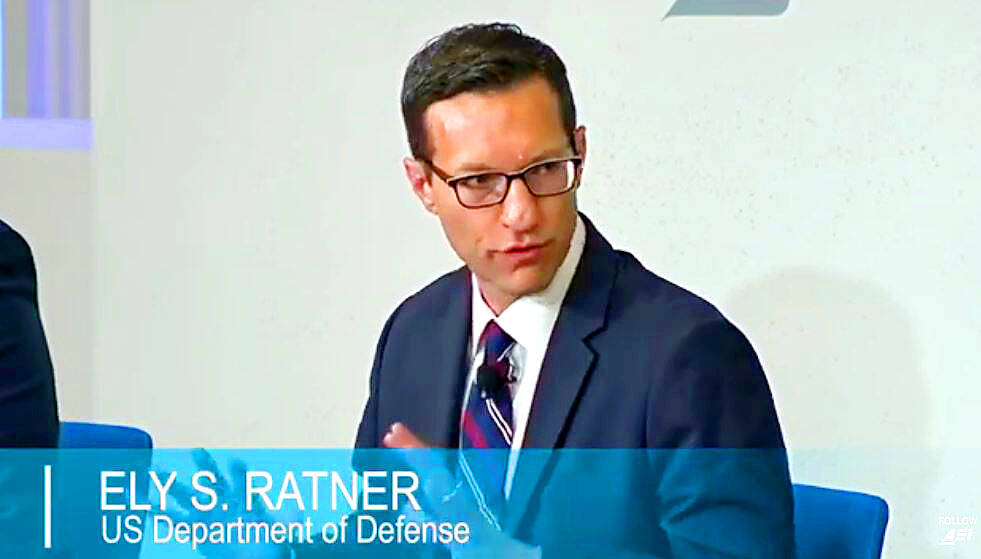Taiwan and the US are improving resilience and innovating operational concepts to maintain the capability to deter Beijing from attacking across the Taiwan Strait, a senior US defense official said on Wednesday.
Keeping Taiwan-US deterrence capabilities strong through improving bilateral cooperation has been a constant task for the US government, US Assistant Secretary of Defense for Indo-Pacific Security Affairs Ely Ratner told the American Enterprise Institute in Washington.
A war in the Taiwan Strait is not imminent or inevitable, he said, citing US Secretary of Defense Lloyd Austin.

Photo: screen grab from the American Enterprise Institute’s YouTube channel
Meanwhile, the Pentagon has made strides in developing a new concept of operations needed to overcome the unique operational challenges posed by the western Pacific region, Ratner said.
The US military is enhancing the dispersion, mobility, resilience and lethality of its forces in the region to deter China from acts of aggression, he said.
The global implications of maintaining peace and stability in the Taiwan Strait are underscored in private and public diplomatic interactions almost every day, he said, adding that more countries are emphasizing to the US the importance of this.
Taiwan can significantly boost deterrence by improving the resilience of its armed forces and society, Ratner said.
Efforts by the Taiwanese armed forces to enhance deterrence via refining operational planning, developing capabilities and conducting exercises have been heartening to the US, he said, adding that developments are positive across the board.
The consistent policy of the US is to maintain the “status quo” in the Taiwan Strait and oppose any unilateral attempts to change it, he said.
Ratner is a frequent contributor to the American Enterprise Institute and a policy veteran at the US Department of Defense.
Separately, US Assistant Secretary of State for East Asian and Pacific Affairs Daniel Kritenbrink told the event that US Secretary of State Antony Blinken is expected to emphasize Washington’s concern with Beijing’s escalating use of coercion against Taiwan.

INVESTIGATION: The case is the latest instance of a DPP figure being implicated in an espionage network accused of allegedly leaking information to Chinese intelligence Democratic Progressive Party (DPP) member Ho Jen-chieh (何仁傑) was detained and held incommunicado yesterday on suspicion of spying for China during his tenure as assistant to then-minister of foreign affairs Joseph Wu (吳釗燮). The Taipei District Prosecutors’ Office said Ho was implicated during its investigation into alleged spying activities by former Presidential Office consultant Wu Shang-yu (吳尚雨). Prosecutors said there is reason to believe Ho breached the National Security Act (國家安全法) by leaking classified Ministry of Foreign Affairs information to Chinese intelligence. Following interrogation, prosecutors petitioned the Taipei District Court to detain Ho, citing concerns over potential collusion or tampering of evidence. The

‘FORM OF PROTEST’: The German Institute Taipei said it was ‘shocked’ to see Nazi symbolism used in connection with political aims as it condemned the incident Sung Chien-liang (宋建樑), who led efforts to recall Democratic Progressive Party (DPP) Legislator Lee Kun-cheng (李坤城), was released on bail of NT$80,000 yesterday amid an outcry over a Nazi armband he wore to questioning the night before. Sung arrived at the New Taipei City District Prosecutors’ Office for questioning in a recall petition forgery case on Tuesday night wearing a red armband bearing a swastika, carrying a copy of Adolf Hitler’s Mein Kampf and giving a Nazi salute. Sung left the building at 1:15am without the armband and apparently covering the book with a coat. This is a serious international scandal and Chinese

Seventy percent of middle and elementary schools now conduct English classes entirely in English, the Ministry of Education said, as it encourages schools nationwide to adopt this practice Minister of Education (MOE) Cheng Ying-yao (鄭英耀) is scheduled to present a report on the government’s bilingual education policy to the Legislative Yuan’s Education and Culture Committee today. The report would outline strategies aimed at expanding access to education, reducing regional disparities and improving talent cultivation. Implementation of bilingual education policies has varied across local governments, occasionally drawing public criticism. For example, some schools have required teachers of non-English subjects to pass English proficiency

TRADE: The premier pledged safeguards on ‘Made in Taiwan’ labeling, anti-dumping measures and stricter export controls to strengthen its position in trade talks Products labeled “made in Taiwan” must be genuinely made in Taiwan, Premier Cho Jung-tai (卓榮泰) said yesterday, vowing to enforce strict safeguards against “origin laundering” and initiate anti-dumping investigations to prevent China dumping its products in Taiwan. Cho made the remarks in a discussion session with representatives from industries in Kaohsiung. In response to the US government’s recent announcement of “reciprocal” tariffs on its trading partners, President William Lai (賴清德) and Cho last week began a series of consultations with industry leaders nationwide to gather feedback and address concerns. Taiwanese and US officials held a videoconference on Friday evening to discuss the